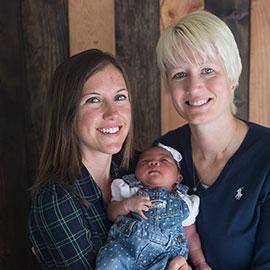
For the 2025 tax year, you could receive up to $17,280 to help offset your adoption expenses, making your dream of growing your family through adoption more achievable than you might think.
As you plan your adoption journey, you should know about one of the most powerful financial tools available: the federal adoption tax credit.
Quick Facts About the Adoption Tax Credit
This could help reduce your adoption costs significantly.
-

2025 Maximum Credit: $17,280
-

Covers most adoption-related expenses
-

Dollar-for-dollar tax reduction
-

Unused credit can be carried forward for 5 years
-

Full credit available for incomes up to $259,190
Wondering how much you could save? Here's how it works and why it matters for your adoption journey.
How the Credit Works
The adoption tax credit is especially valuable because it's a tax credit rather than a tax deduction — and there's a big difference between the two.
A tax credit reduces your taxes directly, dollar-for-dollar. For example, if you owe $20,000 in taxes and qualify for the full 2025 adoption tax credit of $17,280, the credit would reduce your taxes owed to just $2,720. That's a direct savings of $17,280!
In contrast, a tax deduction only reduces your taxable income. If this were a tax deduction instead of a credit, and you were in the 24% tax bracket, that same $17,280 would only save you about $4,147 in taxes - much less than the credit's dollar-for-dollar reduction.
Important Details:
-

Non-refundable Credit: This means the credit can only reduce taxes you actually owe — you won't receive a refund for any amount that exceeds your tax liability.
-

Five-Year Carryover: If your credit amount is more than your tax liability, don't worry — you can carry forward the remaining amount for up to five years.
-

Annual Increases: The maximum credit amount is adjusted each year to account for cost-of-living changes, typically increasing the amount you can claim.
Eligible Expenses
Most adoption-related expenses qualify for the tax credit, including:
-

Court costs and attorney fees
-

Agency and program fees
-

Travel expenses, including meals and lodging
-

Home study fees
Birth parent financial support
-

Other expenses directly related to the legal adoption
-

Some expenses that don't qualify include:
-

Expenses reimbursed by your employer
-

Step-parent adoption costs
-

Surrogacy expenses
Income Requirements for 2025
Your eligibility for the adoption tax credit depends on your income level. The IRS uses your Modified Adjusted Gross Income (MAGI) to determine how much of the credit you can claim. Your MAGI is typically your adjusted gross income (found on your tax return) with certain deductions and exclusions added back. The amount you can claim gradually decreases as your income increases within the qualified range.
If your Modified Adjusted Gross Income (MAGI) is...
-

$259,190 or less: You can claim the full credit amount.
-

$259,190 – $299,190: You can claim a reduced portion of the credit.
-

$299,190 or more: You are not eligible to claim the credit.
Not sure about your MAGI? Your tax professional can help you calculate it and determine exactly how much of the credit you can claim.
How to Claim the Adoption Tax Credit
Claiming the credit involves submitting the appropriate forms and documentation as part of your regular tax return. Because of the complex requirements, we recommend working with a qualified tax professional who can guide you through this process.
Documentation: The IRS requires detailed proof of all qualified adoption expenses. As you go through the adoption process, be sure to keep meticulous records of all your adoption-related expenses, including receipts and invoices, financial documents, proof of payment, travel records, and agency and attorney billing statements.
Forms & Filing: When you're ready to file your taxes, complete IRS Form 8839 (Qualified Adoption Expenses) listing all your eligible expenses. Include the completed form, along with copies of all your supporting documentation, with your tax return. If your adoption has been finalized, include the final adoption decree or certificate as well.
Frequently Asked Questions
Even if an adoption attempt is unsuccessful, you may still be eligible to claim the Adoption Tax Credit for expenses incurred during the process, provided you meet the other necessary qualifications. This provision helps protect families who have invested in an adoption opportunity that didn't result in placement.
Yes, adoptive families may be able to claim the Adoption Tax Credit for multiple adoption opportunities pursued during the previous year, even if some adoptions did not finalize. Specific IRS requirements apply, so it's important to consult with a tax professional about properly claiming the credit for each adoption attempt.
For domestic adoptions, you can claim the credit in the year after you incurred the expenses. However, if you complete the adoption in the same year you incurred the expenses, you can claim the credit that year. For expenses incurred after finalization, you can claim them in the year they were paid.
Want to learn more about growing your family?











